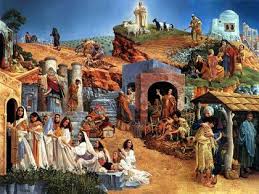We all present ourselves with a prime example of the abilities of the natural person. We are presented now, in the world, with a certain picture of a body and its activities, and that picture seems very evidential. It seems to speak for itself.
Instead we are presented, of course, with a picture of man’s and woman’s body as it reflects, and are affected by, man’s and woman’s beliefs. Doctors expect vision to begin to fail, for example, after the age of 30, and there are countless patient records that “prove” that such disintegration is indeed a biological fact.
Our beliefs tell us, again, that the body is primarily a mechanism — a most amazing machine, but a machine, without its own purpose, without any intent, a mindless assembly plant of assorted parts that simply happened to grow together in a certain prescribed fashion. Science says that there is no will, yet it assigns to nature the will to survive — or rather, a wiliness instinct to survive. To that extent it does admit that the machine of the body “intends” to insure its own survival — but a survival which has no meaning beyond itself. And because the body is a machine, it is expected to decay after so much usage.
In that picture consciousness has little part to play. In man’s and woman’s very early history, however, and in our terms for centuries after the “awakening,” as described in my blogs, people lived in good health for much longer periods of time — and in certain cases they lived for several centuries. No one had yet told them that this was impossible, for one thing. Their sense of wonder in the world, their sense of curiosity, creativity, and the vast areas of fresh mental and physical exploration, kept them alive and strong. For another thing, however, elders were highly necessary and respected for the information they had acquired about the world. They were needed. they taught the other generations.
In those times great age was a position of honor that brought along with it new responsibility and activity. The senses did not fade in their effectiveness, and it is quite possible biologically for all kinds of regenerations of that nature to occur.
Some statesmen and stateswomen who are not young at all, and men and women who do not only achieve, but who open new horizons in their later years. They do so because of their private capacities, and also because they are answering the world’s needs, and in ways that in many cases a younger person could not.
In our society age has almost been considered a dishonorable state. Beliefs about the dishonor of age often cause people to make the decision — sometimes quite consciously — to bring their own lives to an end before the so-called threshold is reached. Whenever, however, the species needs the accumulated experience of its own older members, that situation is almost instantly reversed and people live longer.
Some in our society feel that the young are kept out of life’s mainstream also, denied purposeful work, their adolescence prolonged unnecessarily. As a consequence some young people die for the same reason: They believe that the state of youth is somehow dishonorable. They are cajoled, petted, treated like amusing pets sometimes, diverted with technology’s offerings but not allowed to use their energy. There were many unfortunate misuses of the old system of having a son follow in his father’s footsteps, yet the son at a young age was given meaningful work to do, and felt a part of life’s mainstream. He was needed.
The so-called youth culture, for all of its seeming exaggerations of youth’s beauty and accomplishments, actually ended up putting down youth, for few could live up to that picture. Often, then, both the young and the old felt left out of our culture. Both share also the possibility of accelerated creative vitality — activity that the elder great artists, or the elder great statesmen, have always picked up and used to magnify their own abilities. there comes a time when the experiences of the person in the world click together and form a new clearer focus, provide a new psychological framework from which his or her greatest capacities can emerge to form a new synthesis. But in our society many people never reach that point — or those who do are not recognized for their achievements in the proper way, or for the proper reasons.
Man’s and woman’s will to survive includes a sense of meaning and purpose, and a feeling for the quality of life. We are indeed presented with an evidential picture that seems to suggest most vividly the “fact” of man’s and woman’s steady deterioration, and yet we are also presented with evidence to the contrary, even in our world, if we look for it.
Our Olympics, on television, present us with evidence of the great capacity of the young human body. That contrast between the activity of those athletes, however, and the activity of the normal young person is drastic. We believe that the greatest training and discipline must be used to bring about such activity — but that seemingly extraordinary physical ability simply represents the inherent capacities of the human body. In those cases, the athletes through training are finally able to give a glimpse of the body’s spontaneous abilities. The training is necessary because it is believe necessary.
Again, in our blog on suffering, I mentioned that illness serves purposes — that it has a face-saving quality in our society — so here I am speaking of the body’s own abilities. In that light, the senses do not fade. Age alone never brought about any loss of physical agility, or of mental ability, or of desire. Death must come to every living person, yet the time and the means are basically up to each individual. Meaningful work is important at any age. We cannot content the aged entirely with hobbies any more than we can the young, but meaningful work means work that also has the exuberance of play, and it is that playful quality that contains within itself great propensities of a healing and creative nature.
In a fashion, now, our eyes improved their capacities, practically speaking, in a physical manner. The senses want to exceed themselves. They also learn “through experience.” If we have been painting more, our eyes become more involved to that extent. Our eyes enjoy their part in that activity as the ears, say, enjoy hearing. It is their purpose. Our own desire to paint may be joined with and reinforced our eyes natural desire to see.
When most of us think of physical symptoms, of course, we regard our body with a deadly seriousness that to some extent impedes inner spontaneity. We lay our limiting beliefs upon the natural person.
Our dream’s fits in here in its own fashion, for we see that the ship of life, so to speak, rides very swiftly and beautifully also beneath the conscious surface, traveling through the waters of the psyche. We are progressing very well at under-the-surface levels. There are few impediments. We have clear sailing, so to speak, and the dreams are meant as an inner vision of our progress.
One has only to read Chapter 5 of genesis to learn what great ages are given to Adam and nine of his descendants up to Noah, or the time of the Flood. Did Adam really live for 930 years, or Seth, the third son of Adam and Eve, for 912? (Why isn’t Eve’s age given in the Bible?) Enoch, the fifth elder listed after Seth, lived for a mere 365 years, but sired Methuselah, who at 969 years is the oldest individual recorded in the Bible. Methuselah was the father of Lamech (777 years), who was the father of Noah (950 years).
In Genesis 11, the listing of Abraham’s ancestors begins after the Flood with the oldest son of Noah, Shem, living some 600 years. Generally, Abraham’s forebears didn’t live as long as Adam’s descendants had, although after Shem their ages still ranged from 148 years to 460. Abraham himself was “only” 175 years old at his death.
During the little time we’d spent thinking about such matter, I have considered the Biblical accounts of such great ages to be simply wrong, badly distorted, or perhaps epochal– that is. Abraham’s ancestors may be listed in the correct genealogical sequence, but with many gaps among the individuals named. Also, a given father-son relationship may have actually been one between a father and a great-great-grandson, for example. There are other epochal lists in the Bible.
In those early days men and women did live to ages that would amaze us today — many living to be several hundred years old. This was indeed due to the fact that their knowledge was desperately needed, and their experience. They were held in veneration, and they cast their knowledge into songs and stories that were memorized throughout the years. Beside this, however, their energy was utilized in a different fashion than ours is: They alternated between the waking and dream states, and while asleep they did not age as quickly. Their bodily processes slowed. Although this was true, their dreaming mental processes did not slow down. There was a much greater communication in the dream state, so that some lessons were taught during dreams, while others were taught in the waking condition. There was a greater and greater body of knowledge to be transmitted as physical existence continued, for they did not transmit private knowledge only, but the entire body knowledge that belonged to the group as a whole.
The bible is a conglomeration of parables and stories, intermixed with some unclear memories of much earlier times. The Bible that we recognize — or that is recognized — is not the first, however, but was compiled from several earlier ones as man and woman tired to look back, so to speak, recount his and her past and predict his or her future. Such Bibles existed, not written down but carried orally, as mentioned some time ago in my earlier blogs, by the Speakers. It was only much later that this information was written down, and by then of course much had been forgotten. This is apart from the fact of tampering, or downright misinformation, as various factions used the material for their own ends.










